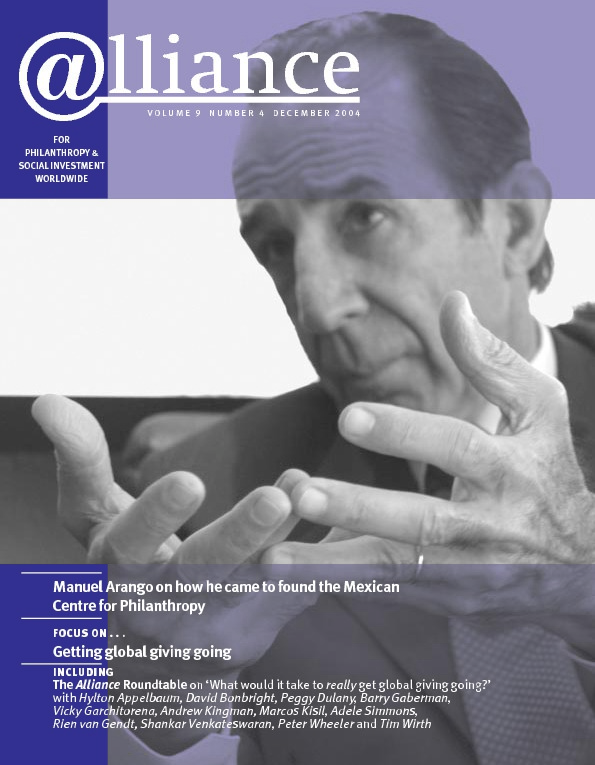Labelled a critique but really much more of a prose poem to philanthropic potential, Just Money is a rapid orientation to what it’s like to lead a philanthropic institution and what one can take away from the experience.
Imagine a room full of intelligent, compassionate people reflecting on much of their life’s work; people who are individually and collectively possessed of the insight earned from decades of experience. This is the place readers enter when they open Just Money. From Steven A Schroeder and Joel L Fleishman to Adele Simmons and Anna Faith Jones, we hear the reflections of one eminent leader after another on the field of philanthropy they have in many ways helped to build.
Just Money is both an anthology of highly analytical essays by some of the world’s most esteemed practitioners and an intensely emotional plea – a plea to their successors – for courage and commitment in the face of great changes, sometimes overwhelming challenges and seemingly limitless opportunity.
But, for good or ill, the essays do not represent a coherent whole or a coherent theory of the field. The perspectives of different essays are quite obviously at odds with one another. Peter Goldmark paints a world out of balance and on the very brink of ecological disaster. His clarion call: ‘It is almost too late to work around the edges’, stands in stark contrast to the conviction of Anna Faith Jones, whose wisdom and advice stems from decades of listening and responding to local, community needs. For Jones, the fundamental purpose of philanthropy is ‘to make it possible for individuals to emerge from the constraints of history… [to] work for individual freedom.’ These two perspectives place in stark relief the very real and very difficult choices facing donors and those who work in philanthropy.
Other contributors argue for greater focus and strategy in philanthropy, or for eschewing business perspectives because of the limitations of a bottom-line mentality. Some see greater regulation and accountability as the beginning of a new golden age, while others argue convincingly for renewed efforts to preserve the flexibility that is ‘private philanthropy’s greatest asset’.
What the essays do have in common, however, is the belief that choices in philanthropy are never value-neutral and that judgement is a crucial prerequisite to making good choices, even though some would argue that that judgement is born of disciplined analysis of data and trends, where others assert the value of intuition.
In the end, Just Money is, among other things, a great concept. Inviting reflection from leaders as they are leaving the field means that the authors are free from the obligations of position and able to be candid. Asking mature thinkers to reflect on decades of experience ensures perspective. I imagine I will go back to this volume again and again, especially to the opening essay by Peter Karoff, which is a tour de force. Karoff invites us to look at all of philanthropy and offers his own views as to the degree of development and potential in various areas from community to corporate and from family to independent foundations. It is both provocative and an excellent orientation to what’s been going on in the four corners of philanthropy for the last several decades.
I am hoping for a sequel to Just Money that continues to capture the evolving perspectives of thought leaders in an arena that, I believe, is at a tipping point. Let’s hear from the insider/outsiders, those who know many philanthropies up close and personal but from a different perspective – that of helper and analyst. I would nominate Katherine Fulton of the Global Business Network/Monitor Institute, Mark Kramer of the Foundation Strategy Group, Kathleen Enright of Grantmakers for Effective Organizations, Phil Buchanan of the Center for Effective Philanthropy, Jeff Braddach of the Bridgespan Group, and Lucy Bernholz of Blueprint R&D for starters. Where do they think the field is headed? And, what would they do if they were leading – rather than advising – philanthropies?
Barbara Kibbe is Vice President, Program and Effectiveness, at the Skoll Foundation. She can be contacted at bkibbe@skollfoundation.org
Just Money: A critique of contemporary American philanthropy
H Peter Karoff (ed) TPI Editions $20 paperback
ISBN 0975331116
To order
TPI Editions, c/o PSSC, 46 Development Road, Fitchburg, MA 01420 USA
Phone +1 978 342 9676,
Fax +1 978 348 1233
Email orders@pssc.com
Website http://www.tpi.org





Comments (0)